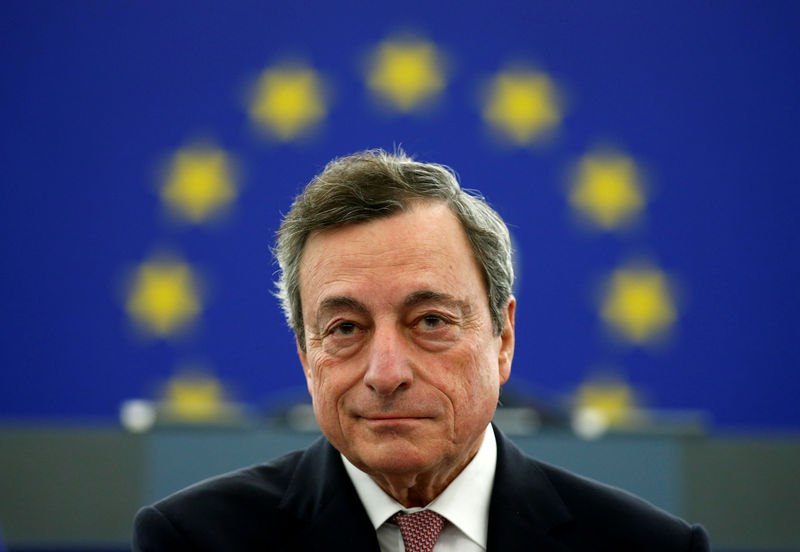(Bloomberg) -- Go inside the global economy with Stephanie Flanders in her new podcast, Stephanomics. Subscribe via Pocket Cast or iTunes.
German hawks lost another toehold on the European Central Bank this week. But Angela Merkel didn’t seem too bothered.
Sabine Lautenschlaeger quit the bank’s Executive Board Wednesday, frustrated at her failure to rein in monetary stimulus, in the sort of move that has triggered a German backlash in the past. This time the response was muted and Merkel herself called on European governments to help out the central bank, rather than let it become a political football.
“Monetary policy is something which concerns people and which is perceived very differently in Portugal and Greece or in Germany and the Netherlands,” the chancellor said at a conference in Frankfurt Thursday. “The political task that we have is, of course, not to overburden monetary policy, but with sensible reforms and finance policies to make sure that the ECB is not overburdened.”
That intervention was all the more striking because Merkel herself is in a tricky spot with the central bank at the moment.
ECB chief Mario Draghi is among the prime movers in an international campaign for fiscal stimulus from Berlin. At home, Merkel is facing criticism because Germany failed, once again, to secure the ECB presidency when Draghi steps down on Oct. 31.
Yet behind the scenes, there’s a sense that the central bank’s arguments are starting to gain traction.
Former Bundesbank chief Axel Weber said this week that Merkel should deliver the fiscal stimulus Draghi is calling for to help keep the European economy going. Even Wolfgang Schaeuble, the former finance minister who helped conceive her balanced budget policy, says it’s time to consider whether some more investment would be needed.
Germany’s political class still struggles to accept the loss of its dominance over European monetary policy, even after 20 years. Before the euro, the Bundesbank set the benchmark rate for a continent. Since then, officials in Berlin have watched a Dutchman, a Frenchman and now an Italian take the helm. And the next president will be a Frenchwoman.
"We don’t want a German monetary policy in Europe", said Alexander Radwan, a lawmaker from Merkel’s Bavarian sister party the Christian Social Union. "But we want a large country like Germany to be properly represented in the European Central Bank.”
In the past, Schaeuble blamed Draghi’s loose monetary policy for the rise of the populism and his influence remains. Bild, Germany’s biggest-selling newspaper, is still running a campaign against Draghi and the populist AfD is winning support from savers frustrated with ultra-low interest rates.
"Those who claim that the ECB’s monetary policy is misguided and harms German interests will feel confirmed," said Clemens Fuest, German economist and president of the country’s Ifo Institute. "Public critique of the ECB for the negative side effects of low interest rates will become even more popular than it is today."
Dramatic Exit
Draghi’s regime has been particularly turbulent and the final weeks before Christine Lagarde takes over have been marked by a revolt featuring Bundesbank President Jens Weidmann over his decision to restart quantitative easing.
Weidmann was also a candidate, but he failed to win the support of euro-area leaders.
"For those in Germany who care about a stable currency, it was a big disappointment that Weidmann didn’t get the post," said Klaus-Peter Willsch, a lawmaker in Berlin from Merkel’s CDU. "Germany’s economic weight isn’t properly represented in the ECB."
Serial Quitters
The Germans, it has to be said, carry their share of the blame for that.
Lautenschlaeger bowed out rather than fight her corner. So did former Chief Economist Juergen Stark, while former board member Joerg Asmussen and Weber himself also quit. European officials told the Germans that Weidmann’s hard line track record made his candidacy a long shot, but Merkel stuck by him anyway (and ultimately placed a German at the head of the European Commission instead).
Otmar Issing, in fact, is the only German to have completed his term on the Governing Council, and he retired before the financial crisis pitched policy makers into the world of extraordinary measures.
But a new generation of policy makers are taking a more conciliatory view. Where Schaeuble railed against Draghi’s decisions when he was finance minister, his successor Olaf Scholz prefers to emphasize how the ECB’s monetary policy helped Germany out of a crisis.
A spokeswoman for the German Finance Ministry said the euro zone’s biggest country expects to retain its seat on the ECB board and will soon nominate a “suitable candidate” to succeed Lautenschlaeger.
